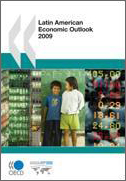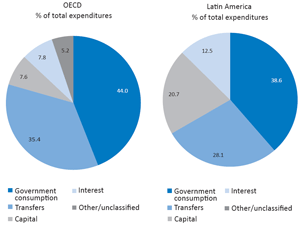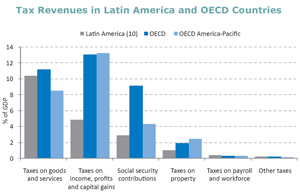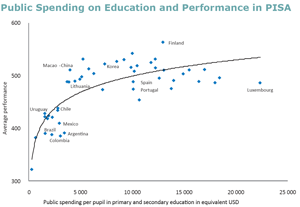Latin America and the Caribbean
Latin American Economic Outlook 2009
Contents | Related Publications & Downloads | How to obtain this publication
Additional info | Contacts | Learn more about LEO
| Chile |
For more information on presentations: [email protected]
The latest avaible edition is available at: www.oecd.org/dev/publications/leo
|
Are Latin American governments maximising the potential of fiscal policy as a development tool? This 2009 edition of the annual OECD Latin American Economic Outlook analyses the progress governments in the region have achieved in the fiscal realm during the last decade. It concludes that they could do much more to exploit the ability of fiscal policy to boost economic growth and combat poverty and inequality. In the current context of global financial turmoil, the relevance of fiscal management is more important than ever. This is essential reading for those who want to know more about fiscal policy in Latin America, its impact on development and the challenges that lie ahead. |
|
Check out our Multimedia page
|
The link between fiscal policy and development Latin American governments have not neglected fiscal policy as a macroeconomic stabiliser, but taxation, public spending and public debt management can also be deployed to reduce poverty and inequality. Transparent and progressive tax systems and high-quality public goods and services are signs of a healthy social contract and consequently assets for democratic legitimacy. The potential of fiscal policy to promote development and consolidate this democratic legitimacy is still substantially unrealised in the region. |
|
|
Did you know? |
|
|
|
Recent trends in Latin America's fiscal performance Since the end of the debt crisis of the 1980s, Latin American governments have reduced deficits, lowered fiscal volatility, increased public expenditure and pioneered fiscal innovations. However, important problems remain: revenue generation relies on volatile non-tax sources and regressive indirect taxes, while public spending and social transfers play a very limited distributive role. The performance gap with OECD countries is still high. |
|
Public debt, political cycles and capital markets Latin American political cycles affect sovereign bond markets as investors worry about the effect of elections on debt management: investors fear an increase in public spending by incumbent politicians as well as the economic policies platforms of populist candidates. Although recent democratic consolidation and the development of domestic bond markets have eased the effect of politics on capital markets, sounder public debt management and information flows around elections remain a challenge. |
Did you know? During 1990-2006, fiscal expenditure increased by 0.7 GDP percentage points in Latin America during election years. In contrast, the public-spending impact of elections was essentially zero in OECD countries.
|
|
|
Tax revenues in Latin America Fiscal revenues have increased in Latin America during the last decade, though countries’ experiences vary within the region and most governments still strive to improve tax collection. In particular, too little revenue comes from personal income taxes and too much from regressive indirect taxes, which explains in part why tax systems do so little to reduce inequality. This pattern of public revenues is in large part the consequence of low average incomes and an unequal income distribution. (enlarge graph) |
|
Fiscal policy and informality in Latin America Informality is an important and persisting feature of Latin American economies. Informal workers are not all simply tax evaders: many are poor workers, excluded from formal labour markets and deprived of economic rights. Enforcement is essential, but simplified regimes that align the costs of formality with its benefits, together with the provision of social services to formal and informal workers on a more equal footing, can help Latin American fiscal systems to deal better with informality. |
Did you know? More than half of Latin American workers are not entitled to pension rights through their jobs. |
|
|
Public spending and the quality of education Social spending is rising in Latin America, but the region still needs to improve the quantity and quality of publicly provided goods and services. More money matters, but how that money is spent matters as much or even more. The OECD experience in areas where public spending contributes to development, such as education, shows that there is not necessarily a trade-off between performance quality and equity. Nevertheless, the policies that matter most for student learning are often under-emphasised in Latin America. |
Related Publications & Downloads
Executive Summary: Latin American Economic Outlook 2009
(exists also in Spanish, Portuguese, Chinese, Japanese)
Policy Brief: "Making Fiscal Policy Work for Development in Latin America"Policy Insights 81: Living with Duality: Fiscal policy and informality in Latin America
Policy Insights 80: Public Spending on Education in Latin America: Does it pay?
Policy Insights 79: Taxes in Latin America: Do wealth and inequality matter?
Policy Insights 78: Public Debt Management and Political Cycles: Challenges for Latin America
Policy Insights 77: Taxes and Spending in Latin America: First stability, now development
Working Papers:Wall Street and Elections in Latin American Emerging
Video and Podcast Interviews
|
According to the OECD's Latin American Economic Outlook 2009, fiscal reform is necessary in Latin America to boost economic growth and combat poverty and inequality. |
 |
|
|
Jeff Dayton-Johnson "Latin American governments need to increase the quality and quantity of both revenues and expenditures" |
How to obtain this publication
- Browse free online and purchase via our OECD Online Bookshop.
-
Subscribers and readers at subscribing institutions can access the online edition via SourceOECD.
-
Government officials with accounts can browse OLISnet, under "books" tab.
- Accredited journalists can access by password.
- Check the Distribution list in Latin America of the Latin American Economic Outlook.
- For specific requests, please contact: [email protected]
ISBN: 978-92-64-03917-9 / 200 pages / Price: €20 $30
Please contact the Development Centre at [email protected].
Interested institutions are invited to contact Angel Alonso ([email protected], +33 1 45249411).
Journalists are invited to contact Colm Foy ([email protected], +33 1 4524 480).
Related Documents






 English
English